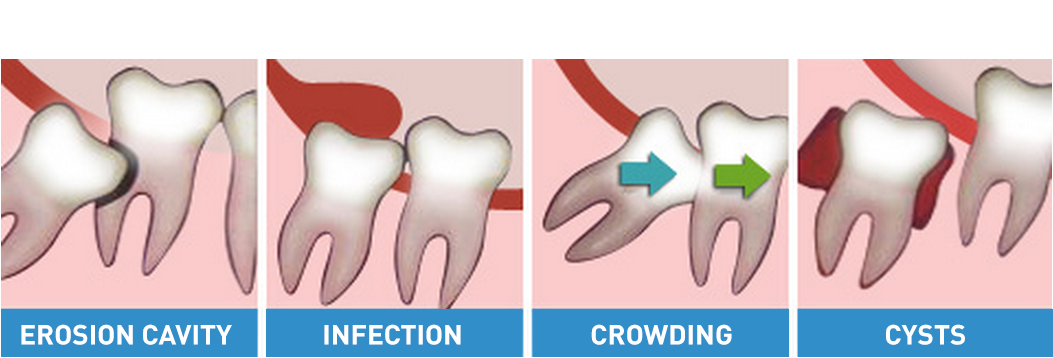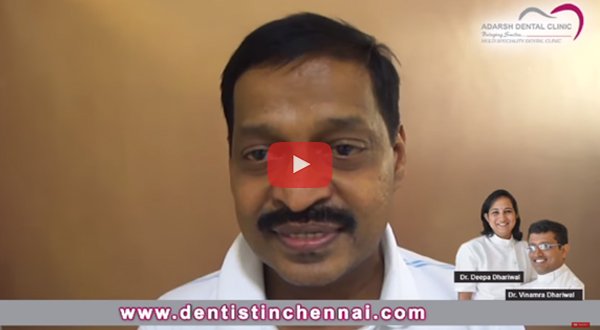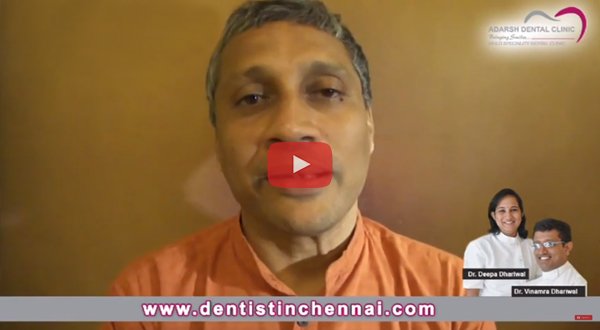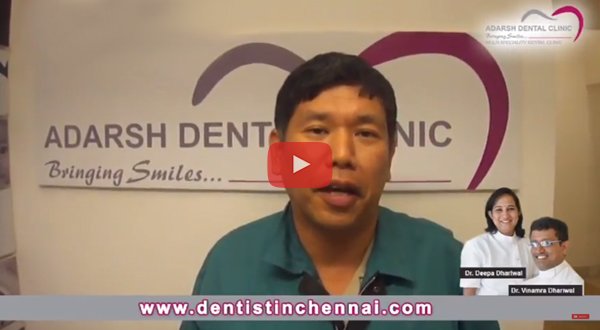Wisdom teeth are usually situated below the gum at the back side of the jaw. There are usually four wisdom teeth at each corner of the tooth line. They are also known as third molars. They may take time to develop and may come up during late teenage or early twenties. They may get stuck or emerge partially due to lack of space. Then they are called impacted teeth. Such teeth can cause many dental issues like infection, Gum Diseases, tooth decay of adjacent teeth, cyst and sometimes Jaw Tumours. These signs of wisdom tooth problem includes
1. Swelling/bleeding/pain of the gums at the end of teeth line behind the corner of mouth
2. Difficulty in opening mouth and chewing foods
3. Pain on biting and pain radiating to ears, jaws and head.
If you are facing such issues because of the impacted wisdom teeth, it should then be removed.
Consult your doctor immediately if any signs of discomfort or pain is experienced due to impacted wisdom teeth. After through examination, the doctor will suggest you whether you require teeth removal or not. In cases where a person’s teeth are infected under any circumstances, the teeth removal surgery is conducted. Tooth removal surgery is not a simple one. Proper preparation and oral health management care before the surgery is required and suggested.
The first step for the surgery is giving anaesthesia. A local anaesthesia is given to the patient before the surgery is initiated. Sometimes the procedure is done under conscious sedation or Sleep Dentistry. The doctor then proceeds to open up the gum tissue and remove the bone covering the tooth. The tissue connecting the tooth and bone are separated and tooth is removed. The surgery site will be stitched after the tooth is removed. The stitch dissolves gradually over time or is removed by the doctor on further follow-ups.
Recovery may take only few days. Pain killers are usually prescribed after the surgery by dentist for relief from pain that may follow. The procedure is quite simple, although associated with certain complications and risks. Below we have listed out few commonly observed side-effects:
1. Swelling and pain in the tooth socket and gums
2. Bleeding
3. Pain
4. Damage to the dental bridges or crowns (if you are using it)
5. Dry socket (a painful inflammation)
6. Other rare side effects like temporary loss of taste sensation and pain perception on lips.
The procedure may take a few minutes. You may take good care after the surgery to prevent it from other complications and risks. Simple methods can help you from many issues. You can use ice packs to decrease the pain and swelling. You can rinse your mouth with salt water to speed up healing and prevent irritations. The use of tea bag is reportedly a good choice for those who suffer from bleeding after the teeth removal surgery.
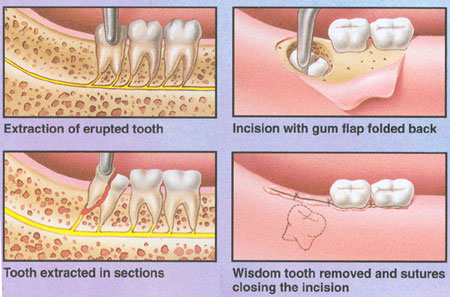
After surgery for a better healing try to avoid:
1. Spicy foods.
2. Smoking.
3. Hot and Hard foods .
4. Driving.
5. Using straws.
6. Use of alcohol and tobacco etc.
7. Exercises and heavy workouts.
Do not use pain relievers and such tablets without the prescription of the doctor. Talk to the doctor if you experience vomiting and nausea. It is important to maintain your oral hygiene throughout by keeping your mouth clean before and after surgery. It will help you to prevent infections.
We, at Adarsh Dental Clinic, will be at your help to maintain your oral health at its peak. Our team of Jaw surgery specialist i.e. Oral and Maxillofacial surgeons and other doctors use latest modern treatment patterns to resolve your problems and help you get a satisfying and quick recovery. To book an appointment with us, call now at +91-44-24612461.



